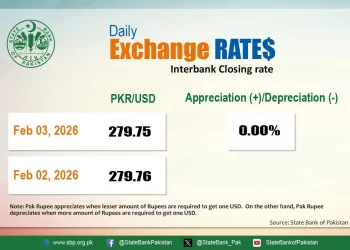SHANGHAI: China’s yuan ticked down against the US dollar on Thursday as investors looked past an encouraging manufacturing activity survey to next week’s US election and policy risks for China.
China’s manufacturing activity in October expanded for the first time in six months, an official factory survey showed on Thursday.
“The improvement in PMIs (Purchasing Managers’ Index) highlighted growing optimism about China’s growth outlook following the announcement of the stimulus measures,” said Ken Cheung, director of currency strategy at Mizuho Securities Aisa.
“The outcomes are encouraging but more follow-up measures and the implementation are needed to sustain the optimism,” Cheung said.
The dollar index extended its retreat from a near 3-month peak overnight but was 0.067% higher at 104.16 on Thursday.
Traders and investors are eagerly awaiting next week’s US election and a key leadership meeting in China for direction on the yuan-dollar pair.
Investors have been buying the dollar and selling emerging market currencies, mainly the yuan, in the run-up to the Nov. 5 US election as they braced for the possibility Republican candidate Donald Trump could be president again.
Opinion polls show Trump is neck and neck with Vice President Kamala Harris and the race is too close to call.
As part of his pitch to boost American manufacturing, Trump has promised voters he will impose tariffs of 60% or more on goods from China. The proposed tariff and tax policies are expected to keep US interest rates high and undermine currencies of trading partners.
China’s yuan eases
Citi’s macro strategists and traders have been highlighting that upside of the dollar against the offshore yuan as the most popular US election trade in many client portfolios.
They said these trades have “skewed risk/reward towards USD-CNH downside”.
The offshore yuan traded at 7.1299 yuan per dollar, down about 0.06% in Asian trade.
During Trump’s first presidency, the yuan weakened about 5% against the dollar in the initial round of US tariffs on Chinese goods in 2018, and fell another 1.5% a year later when trade tensions escalated.
The spot yuan opened at 7.1174 per dollar and was last trading 67 pips lower than the previous late session close at 7.1217 as of 0302 GMT.
Prior to the market opening, the People’s Bank of China (PBOC) set the midpoint rate, around which the yuan is allowed to trade in a 2% band, at 7.1250 per dollar.







